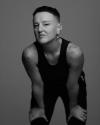Topics in Movement Practices:
Undercurrent Floorwork Technique
Dance 244C
Winter 2024
Meany 265
M/W/F 12:30-2:00 - 3 Credits
Instructors: Alethea Alexander (she/her), Hilary Grumman (she/her)
Office Hours: by appointment only, Mondays following class meeting, location TBA
Emails: aletheas@uw.edu, hgrumman@uw.edu
Course Description
This class is designed for folks with a range of movement experiences who want to gain more comfort moving low to the floor, and build full body strength, structural awareness, and expanded range of motion. We will ease into efficient fundamentals, build muscle memory for inversions, and cultivate an immersive floorwork flow that will gather momentum throughout the quarter. Every class utilizes repetition to grow from simple foundations to more complex sequences, inversions, and tricks, culminating in phrase material incorporating the themes of each session.
Undercurrent was initially developed in Seattle in 2017 and draws from training rooted in geographically and stylistically diverse practices, including Piso Móvil, Flying Low, Psico-Físico, RUBBERBAND, Jorge Crecis, Ihsan Rustem, Adam Barruch, Moving Air, Duela-Cemento, A Surprised Body, CONTINUUM, and Austrian Parkour. It is a technique developed and taught by femme leaders and bodies, offering safe, researched, accessible, and inclusive entry points into floorwork and artistry.
Class is co-taught by Alethea Alexander and Hilary Grumman; we believe that co-teaching provides more individualized attention, diverse biomechanical perspective, and helps facilitate a continuous flow for practice.
Course Objectives/Foci:
In this class we will…
- Cultivate continuous, whole-body action and strength
- Mobilize and strengthen head/tail curve
- Develop supported strength in moving through head/tail extension
- Safely bear weight on all surfaces of the body, in static and moving points of connection to the floor
- Practice prioritizing efficiency of effort as a tool for strength and qualitative clarity
- Challenge range of motion and capacity to travel through space
- Pattern structurally sound pathways into and out of low-level movement
- Cultivate group and community care and awareness
- Recognize joy
Requirements and Grading:
- Participation (40%)
- Technique, Effort and Engagement (43%)
Other assignments (outside of class):
-
- Mid-Term Reflection (5%)
- Attend a Monday Night Undercurrent Class at Fremont Abbey (7%)
- Final Self-Reflection (5%)
Course Grade Scale:
In this course, we use a simplified grade scale for student assessment. We only assign grades in increments of .5 on the GPA scale, as detailed below.
|
4.0 |
> 90% |
|
3.5 |
82 - 89.9% |
|
3.0 |
74 - 81.9% |
|
2.5 |
66 - 73.9% |
|
2.0 |
58 - 65.9% |
|
1.5 |
50 - 57.9% |
|
<1.5 |
< 50% |
Use of Contact and Touch
In this class, touch-based feedback from the instructor and peer-to-peer contact may be offered as strategies to support student learning and curricular goals. Contact and touch are used to provide proprioceptive feedback; sensory information created by contact enables the neuromuscular system to learn new pathways and facilitates multiple aspects of learning. Students always have the right to offer, withhold, withdraw, or modify consent to be touched or to touch another. If a student has concern about the use of touch in class, the student is encouraged to notify the instructor verbally, through email, or with assistance from another peer or instructor in order to share their concern. Instructors are committed to working with students to develop appropriate, individualized learning plans and strategies to support students in meeting course expectations, requirements, and learning outcomes. In classes that rely on partnered touch and support as central aspects of their form (Contact Improvisation, many social dance practices), if touch is an ongoing restriction or concern, the instructor may suggest an alternate dance class within the department.
Department of Dance Studio Guidelines
Department-wide studio guidelines, linked here.
Department of Dance Locker Policies and Access
Please note that we ask you to leave personal items outside the studios during class times. The Department of Dance has lockers available for day and quarter-long use. Need a locker? Check out policy and access here!
Concerns
We – Hilary and Alethea – and the Department of Dance care deeply about your sense of safety, inclusion and support. If you ever have any concerns about our class community, environment, methods, incidents in class, or anything else, we would like to know. If you feel comfortable talking with either of us, please approach us at any time before or after class; if needed, we may ask you to schedule time to meet for office hours to further discuss anything that comes up. If you do not feel comfortable approaching us directly, please know that the Department has a policy in place for how to report and discuss your experience in Dance at UW. Read more about the Departmental policy here.
Religious Accommodations
Washington state law requires that UW develop a policy for accommodation of student absences or significant hardship due to reasons of faith or conscience, or for organized religious activities. The UW’s policy, including more information about how to request an accommodation, is available at Religious Accommodations Policy (https://registrar.washington.edu/staffandfaculty/religious-accommodations-policy/).
Accommodations must be requested within the first two weeks of this course using the Religious Accommodations Request form (https://registrar.washington.edu/students/religious-accommodations-request/).

